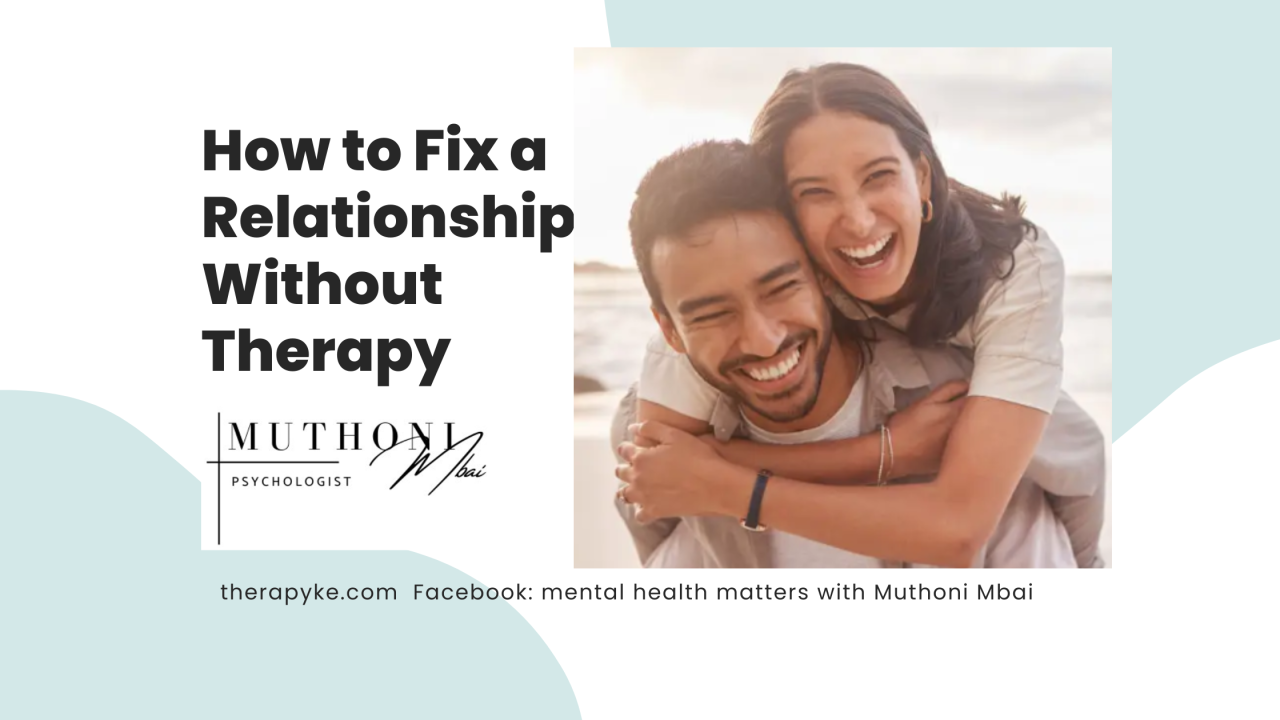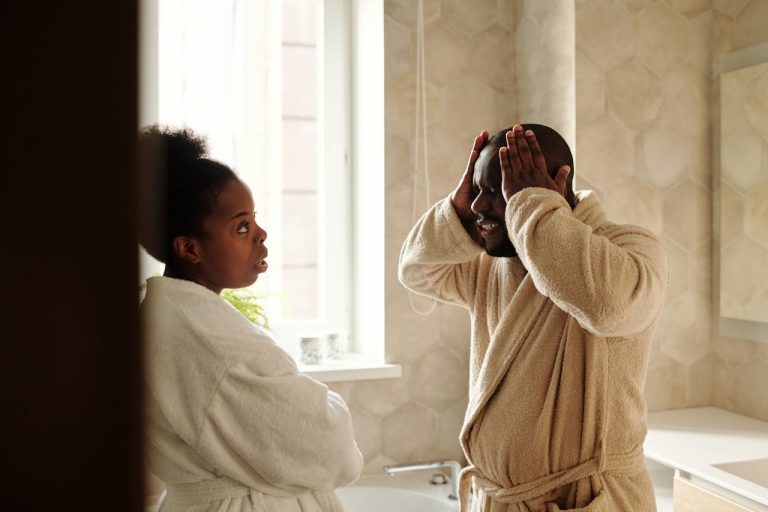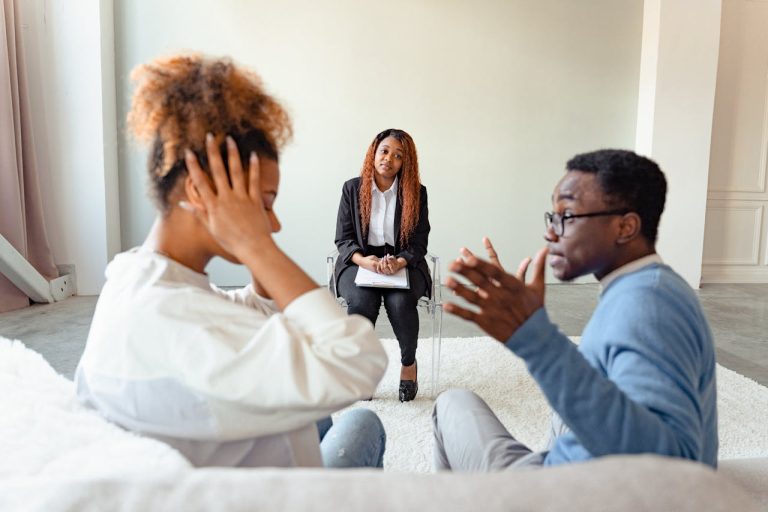
How to Fix a Relationship Without Therapy

Relationships are central to our well-being, offering companionship, support, and love. However, maintaining them isn’t always smooth sailing. Every relationship, no matter how strong, has its challenges. Let’s be honest—relationships can be tough! From minor misunderstandings to major conflicts, no single partnership is entirely free of bumps along the way.
One minute, you feel like this person is your forever—someone you want to be around for the rest of your life. The next, you’re locked in a frustrating battle, struggling to agree on even the smallest things, like what to have for dinner or how to spend a lazy Sunday.
You might have found yourself asking, how many times will I need to go to a therapist? or even, how can I Fix this Relationship Without Therapy? The truth is, while couple’s therapy can work wonders, it’s not the only way to mend and strengthen your connection. Besides, therapy can sometimes be expensive, adding financial stress to an already tricky situation.
Fortunately, there are practical ways to address issues and rekindle love and harmony on your own. In this article, we’ll dive into how to fix a relationship without therapy and explore steps you can take to navigate through the stormy waters of love.
How to Be Brave Enough to End a Relationship?
Before discussing how to fix a relationship, it’s essential to acknowledge that not all relationships are meant to last. Ending a relationship is one of the most challenging decisions you might face, especially when you’ve invested significant time and energy. So, how can you gather the courage to make that decision?
- Reflect on the Relationship: Take an honest inventory of the relationship’s highs and lows. Are your needs being met? Is the relationship bringing more pain than joy? Self-reflection can help you determine if staying is worth the effort.
- Focus on Your Well-being: If a relationship is toxic or abusive, your mental and physical health should come first. Recognize that leaving isn’t a failure but an act of self-preservation.
- Seek Support: Although this article focuses on fixing relationships without therapy, that doesn’t mean you shouldn’t lean on friends, family, or support groups. They can provide the clarity and encouragement you need to take the next step.
- Envision Life Beyond the Relationship: Visualize a life where you feel free, happy, and fulfilled. Sometimes, imagining what could be helps you overcome the fear of letting go.
How to Help a Couple Stay Together?
You’re not a therapist, but maybe you’ve found yourself in a situation where a couple you know keeps asking for your support. It could be friends, family members, or even coworkers who trust you enough to share their struggles. They might be turning to you for advice, hoping you’ll have the magic words to save their relationship.
The truth is, it can feel overwhelming to be placed in that position, especially if you’re unsure how to help. The good news is that while you’re not a professional, there are meaningful ways you can offer support.
First, remember that your role is not to fix their relationship but to encourage and guide them toward healthy interactions. Here are a few ways you can help them stay together:
- Encourage Communication
Help them see the importance of honest and open communication. Suggest that they regularly discuss their feelings, needs, and concerns, and remind them to avoid placing blame.
For example, you could gently suggest they use “I” statements like, “I feel hurt when…” instead of accusatory language that might escalate tensions. Sometimes, just giving them a space to air their thoughts without judgment can help them take the first step toward reconnecting.
- Promote Empathy
Encourage them to consider each other’s perspectives during disagreements. You might ask, “Have you tried seeing this situation from their point of view?” Understanding how their partner feels can help bridge emotional gaps.
It’s often easier to empathize when someone else gently reminds you to step into the other person’s shoes.
- Remind Them to Make Time for Each Other
Life’s demands can make couples drift apart, but quality time is essential for a strong relationship.
Suggest simple ideas like a weekly date night or an activity they both enjoy. Even small moments, like taking a walk together or sharing a meal without distractions, can rekindle their bond.
- Highlight the Power of Apologies and Forgiveness
Sometimes, relationships falter because one or both partners struggle to apologize or let go of past hurts. You can encourage them to own their mistakes and genuinely apologize.
Likewise, gently remind them that forgiveness is not about erasing the past but about making peace with it so they can move forward together.
- Encourage Them to Set Shared Goals
A shared sense of purpose strengthens partnerships. You can suggest they sit down and discuss their goals—whether it’s something big like planning for a home or smaller objectives like saving for a vacation. Working toward these goals as a team can bring them closer and create a sense of partnership.
Sometimes, your role may simply be to listen. Just knowing they have someone they can turn to for support can make a couple feel less isolated in their struggles.
Remember, it’s okay to set boundaries and remind them that professional help is available if their issues are beyond what you can assist with. Ultimately, your encouragement and presence can plant seeds of hope and understanding, helping them rediscover the reasons they chose to be together in the first place.
Where Do I Go for Relationship Advice?
Sometimes, you need external guidance to navigate tough times. Here are a few reliable sources:
- Books and Online Resources: There are countless books and websites dedicated to relationship advice. Look for evidence-based resources written by credible experts. Some highly recommended books include The Five Love Languages by Gary Chapman.
- Trusted Friends and Family: While friends and family can provide helpful insights, it’s important to ensure their advice is unbiased. Avoid sharing sensitive details with people who might use the information against you.
- Online Forums and Support Groups: Relationship forums or local support groups can offer diverse perspectives. Have questions related to relationships? Inbox us on our Facebook Page, and get responses from experts. you can also reach out other online platforms but remember not all responses are from experts and not all advice will apply to your situation.
- Self-Help Programs: Self-guided relationship programs, like the Gottman Institute’s online courses, provide evidence-based tools to improve your relationship from home.
How Can I Improve My Marriage Without Counseling?
Improving a marriage without counseling takes effort, but it’s entirely achievable with intentional actions.
- Rekindle the Romance
Over time, routines can dampen romance. Surprise your partner with thoughtful gestures, write them a heartfelt note, or revisit the activities you enjoyed when you first fell in love. - Work on Yourself
Focus on self-improvement. Whether it’s managing stress, improving communication skills, or addressing personal insecurities, a better you contributes to a better relationship. You can achieve these things through reading resourceful materials, attending mental health workshops or even having individual therapy sessions. - Establish Healthy Boundaries
Healthy boundaries foster respect and trust. Discuss what’s acceptable in your relationship and make agreements about handling disagreements or external influences. - Show Appreciation
Never underestimate the power of gratitude. Express appreciation for your partner’s efforts, big or small, to remind them they’re valued. For instance, while it may seem like an everyday thing to have your partner serve you food, it’s always a thoughtful gesture to say, “Thank you.” Small acts of gratitude go a long way in keeping a relationship healthy and connected. - Resolve Conflicts Constructively
When conflicts arise, approach them as a team rather than adversaries. Focus on finding solutions instead of dwelling on the problem.
Is It Possible to Repair a Marriage Without Couple’s Counseling?
Absolutely. Many couples repair their marriages without formal counseling by adopting the right mindset and strategies. Here is how to fix a marriage without necessarily seeking couple therapy;
- Commit to Change: Both partners must be willing to acknowledge the issues and commit to improving the relationship. Half-hearted efforts often yield minimal results.
- Identify the Root Cause: Is it financial stress? Lack of intimacy? Unresolved past issues? Identifying the underlying problem is crucial for effective resolution.
- Rebuild Trust: If trust has been broken, rebuilding it takes time and consistency. Be transparent in your actions and keep promises to show your commitment.
- Leverage Community Support: Consider joining a faith-based group or community organization focused on strengthening marriages. These environments often provide valuable guidance and encouragement.
- Focus on Small Wins: Celebrate incremental progress. Whether it’s successfully navigating a difficult conversation or spending a joyful weekend together, acknowledging these wins can motivate both partners.
Final Thoughts
Fixing a relationship without therapy is challenging but not impossible. Whether you’re mending a marriage or trying to keep a partnership intact, the key lies in mutual effort, effective communication, and intentional actions. However, it’s also essential to know when a relationship has run its course and prioritize your well-being above all else.
Remember, while therapy is a powerful tool, the foundation of any strong relationship lies in the everyday choices you make together. If you need further support, reach out to us through our Contact Page.



